Student Tips - Tumblr Posts
🎒Backpacks 101🌻
Essentials for Class
Your laptop/spirals/tablet/your preferred note-taking medium. For professors that speak quickly and cover a lot of information in a short amount of time before moving on to the next slide, I always like to use my laptop. Some professors prohibit the use of laptops (even for note-taking). So, I like to use a cheap spiral for class in which I will write information/graphics with the knowledge that they don’t have to be perfect. This is just to ensure that I get the information down. When I get home I transfer all of the notes into a nicer spiral to look over later. This also works to help me retain the information!
My all-time favorite spiral notebooks are the Exceed Five Subject Notebooks. I love these because in the front they have a world map, a punctuation chart, a metric unit conversion chart, spelling rules, a ruler, and a glossary of general reference and research sites.
Loose-leaf paper. This is especially helpful for me because many of my professors will give pop-quizzes/pop-writing assignments. Also great for when a classmate needs to borrow some paper. You can whip it out and make a friend for all semester.
Personally, I like to use Five Star Reinforced Filler Paper by Mead.
Pencil Bag. Naturally, not having to frantically dig around your backpack for a pen/pencil/highlighter makes your day go so much smoother.
I prefer the Mead Five Star Organizer Pencil Pouch.
My pencil bag comes complete with an assortment of pens, pencils, highlighters, two flash drives, a pencil sharpener, and an entire 50 pack of Crayola Super Tips. Yes, my pencil bag fits that much.
Laptop charger & phone charger. I recommend purchasing a powerblock as well to ensure that you don’t have to compete over the use of limited outlets. Thousands of college students across the nation fail to charge their electronics nightly, don’t get caught in the crossfires of that feeding frenzy.
Headphones. Something about not having my music while I’m on the bus or walking across campus really kills my mood for the day.
My planner! Stop writing stuff on your hand or on random pieces of paper. Get yourself a cheap planner. Even if you are not a planner user right now, just forcing yourself to use one for 30 days will forge an unbreakable and life-changing habit! Take it from me.
To Make Your Day Easier
A small umbrella for those days when the weather goes from 75′ and sunny to raining cats and dogs in 3 seconds.
A wallet with your IDs and change. I always kick myself when I didn’t have enough change for the vending machines on campus. I kick myself even harder when I have to ask random strangers for 50 cents to buy a scantron/blue book. Also just a good idea to always have some form of ID on you.
Water bottle. Invest in a super cool, trendy, refillable water bottle to keep yourself hydrated throughout the day. Or just keep refilling the same plastic one.
Deodorant. This is so silly but I am always forgetting to put on deodorant before I walk out the door and I’m 22. When I get to class I realize I’ve forgotten and panic as the Texas heat encompasses me. Travel-sized deodorants are so beneficial.
An emergency tampon/pad. Or two!!! Goes without saying. Surprises are always fun until it’s your period. I keep emergency tampons in my truck, in my apron for work, in my backpack, in my horse trailer. I do not play around.
Ibuprofen/Aspirin
Light snacks. We’re talking a granola bar or seven to keep your stomach from gurgling when you’re taking that exam and of course everyone showed up to class.
A flashdrive.
Chapstick, sunscreen, or lotion can also make you more comfortable sitting in class.
Quick Tips About Backpacks
While, yes, those little fashionable ones are cute, they don’t hold the essentials and can be damaging to your back, causing soreness and discomfort. Buying a Jansport absolutely saved my back and stopped my chronic pain from progressing!
Obviously there are hundreds of amazing brands of backpacks out there, but I strongly urge you to purchase a bag with:
a sleeve inside for your laptop
at least three pockets - so everything has a place
those little mesh side pockets
adjustable (preferably PADDED) shoulder straps!
Another thing! I always place my heavier items (laptop & textbooks) CLOSEST to my back. That way the weight doesn’t drag you down backwards and cause back pain (my doctor literally told me this). This is where having multiple pockets is so helpful.
Adjust your shoulder straps so that you can also maintain good posture while walking. The weight of your backpack + where it sits on your back should not cause you to lean forward or sway backwards in order to compensate. Also fun fact - when I was in middle school I thought it was cool to have a backpack that hung really low (?) and it created a pinched nerve in my neck! Awesome! Don’t be like me!
Remember that backpacks -while they can absolutely be super cute and trendy- are meant to possess functionality. Your backpack should carry the essentials you need to have a successful and comfortable day at class.
Lastly, 10/10 would recommend cleaning out your backpack frequently! Make sure it stays organized and free of clutter. I also like to make sure I take all of my spirals and planner out of my backpack each day after class so that after I rest for a bit - I know I have things I need to get to.
Organizing Your Backpack - By Pockets
-Largest pocket (closest to your back):
Heavier items such as your laptop, binders, textbooks, loose leaf paper and planner. Laptop should go inside the sleeve (if applicable).
-Second largest pocket
Items such as your pencil bag, chargers, and umbrella.
-Smallest pocket
Items that you won’t be pulling in and out too frequently, such as headphones, deodorant, chapstick, a flashdrive, snacks, wallet, keys, painkillers, and your emergency tampons (if applicable).
-Side pockets
Here I obviously like to keep my water bottle or coffee thermos. If you have more than one pocket this is also a great place to keep your little umbrella.
Happy studying, realistic students!


This is a summary of college only using two pictures; expensive as hell.
That’s my Sociology “book”. In fact what it is is a piece of paper with codes written on it to allow me to access an electronic version of a book. I was told by my professor that I could not buy any other paperback version, or use another code, so I was left with no option other than buying a piece of paper for over $200. Best part about all this is my professor wrote the books; there’s something hilariously sadistic about that. So I pretty much doled out $200 for a current edition of an online textbook that is no different than an older, paperback edition of the same book for $5; yeah, I checked. My mistake for listening to my professor.
This is why we download.
Alternatives to buying overpriced textbooks
Textbooknova
Bookboon
Textbookrevolution
GaTech Math Textbooks
Ebookee
Freebookspot
Free-ebooks
Getfreeebooks
BookFinder
Oerconsortium
Project Gutenberg
2018 Student Guide
With the start of 2018 well underway, I wanted to make a masterpost full of links on how to adjust your perspective with studying. Perhaps you want to become a better student overall, improve your focus or get into your dream college, there is always something we want to do better! Hopefully these tips will make 2018 your best academic year yet!
Organisation
2018 student planner
planner brand recommendations
planner vs bullet journal: pros and cons
how to set up a bullet journal
setting up a digital bullet journal
bullet journal spread ideas
bullet journal decoration hacks
bullet journal brand recommendations
whats in my bag
my favourite stationery
back to school basic supplies
how to improve your handwriting
handwriting font suggestions
balancing study and work
desk/workspace essentials
student finance tips
2018 monthly planner printables
Productivity
productivity and time management applications
how to remove distractions
types of procrastination and how to deal with them
google chrome new tab options for improved productivity
10 small ways to improve your productivity
applications to block websites
no distraction writing applications
100 days of productivity challenge
how to focus in class
how to stick to a schedule
how to stay alert
how to build self-discipline
how to organise for exams
my after school routine
how to reduce perfectionist ideas
Motivation
what to do when you’ve tried everything
how to gain back motivation
motivational monday printables
how to stop avoiding studying
what to do when you feel exhausted before studying
how I stay motivated
tips on maintaining motivation
how to start a studyblr
how to utilise your studyblr for motivation
how to set up a studygram
dealing with competitive people
how to bounce back from ‘failure’
how to learn from a lower than expected grade
how to structure a weekly review
how to deal with a difficult class
things to do during holidays/study vacations
Studying
applications for students
how to take effective class or lecture notes
how to take notes from a textbook
how to prepare for exams
my note-taking method
my notebook system
how to write faster
how to study more effectively
how to summarise information
how I organise my binders
good habits to implement
how to study (my method)
how to revise from notes
how to organise a colour code
how to memorise information effectively
how to memorise quotes
how to use flashcards
how I reduce waffle and narration in essays
tips for essay writing
how to find out where you’re going wrong
how I prepare to study
different ways to study
how to study during the semester
how to annotate a book/novel/etc
how to get ahead in school
how to break up a large textbook
studying as a visual learner
how to practice and present a speech
mindmapping apps and extensions
how to deal with online classes
how to study a language
how to study maths
how to improve group assessments/projects
Self Care
how to improve your sleep schedule
how to wake up earlier
how to study when sick
over-coming self doubt
dealing with stress
how to balance studying and anxiety
how to balance studying and depression
apps that help with depression
ways to reward your productivity
my favourite tv shows
my favourite podcasts
ways to use empty notebooks
how to be more sociable
tips for getting a job
advice for the first day
things (personal, academic, etc) to do every week
Printables
2018 monthly planner printables
2018 student printables (includes 2018 overview + calendar, daily + weekly + monthly planner, 30 habit tracker, class overview and timed worklog)
weekly study schedule
weekly planner
weekend planner
daily planner
assessment planner
subject to do list planner
study session planner
exam revision printable pack (includes revision checklist, formulas + definitions sheet, essay + project planner, weekly schedule)
note-taking printables (includes dotted, grid, lined, cornell method)
organic chemistry printable
literary techniques and devices sheet
100 days of productivity tracker printable
ultimate student organiser pack
study and revision pack
2018 student planner
2018 weekly planner
pomodoro tracker
grade and assessment planner pack
essay guide and planner pack
productivity planner
student reading journal printable
student finance planner
goal and habit planner
customisable weekly study planner
Other posts | Printables | Instagram | Youtube | Pinterest | Etsy Shop
How to Get Through University
It has been a long while since I wrote a study-related post. Seeing that I have now completed my Law degree, I thought it would be good to share some tips with you guys on how I personally got through University with my sanity still in tack! ⭐️⭐️⭐️
🌼Attending lectures and class as much as possible - I can’t stress how important this is!! I know it’s tedious having to attend all your classes, but it’s way more stressful to be missing classes and as a result, having to catch up with everything and then worry that you’ve missed out on essential topics.
🌼Study plan - Creating a timetable for your study sessions really helps to keep you in check and gives you a weekly routine that is easy to stick to. Having consistency really makes studying a lot easier and reduces stress!
🌼Making sure to take regular breaks during study sessions - It’s extremely important to give your brain a break! Don’t over do it, allow yourself to relax for a few minutes and get back to studying with a fresh mind.
🌼Do dedicate 1-2 days to completely relax - If you’re getting enough work done during the week you may be able to afford the weekend off! At least, one whole day where you can relax and not have to think about work. This is really good for your sanity, so please do it!
🌼Keep up with your social life or do things you enjoy - Hang out with friends and make plans. If you’re not into that, make sure you spend time doing something fun! Join a society or a sport, keep up with a hobby, play a game or go for a jog. Be active in your life and do things apart from just studying! Your purpose is greater and life is too short.
🌼When you are losing your motivation spend a day at the library - It happens to us all, sometimes we stay at home with no motivation to do any work. A good idea is to get ready, grab some lunch or snacks and head to the library. Just take it easy but try to get something done. You’ll feel much better that you’ve actually put yourself in a position where you’ve done a bit of work than to stay in bed all day.
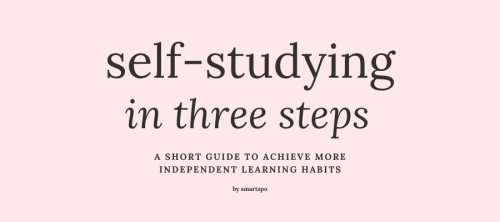
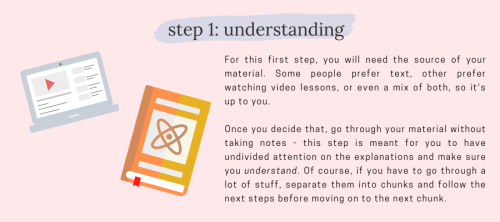
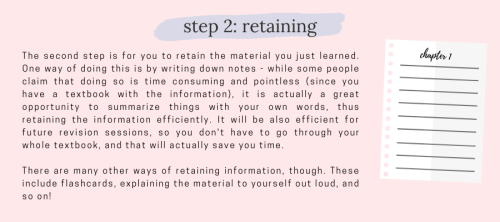

now that most of us are at home, i thought this could be useful to the ones who aren't that used to learning material on their own and aren’t sure where to start, or which order of steps to follow. happy studying! 💗
studygram
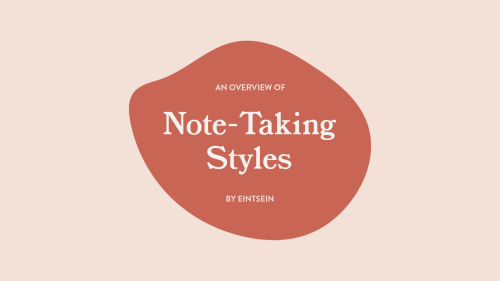

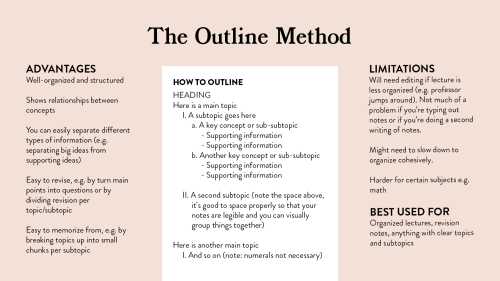
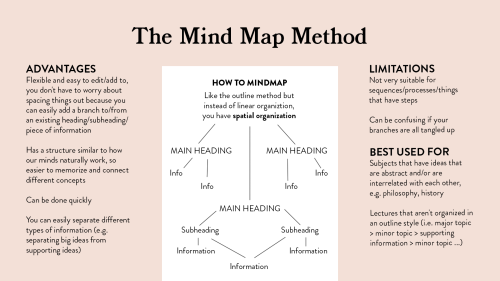

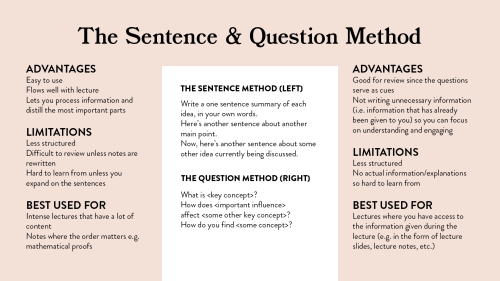


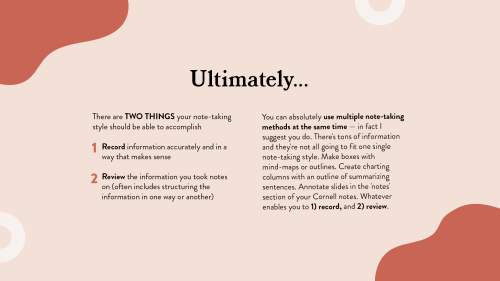
An Overview of Note-Taking Styles
Note-taking is one of the most essential skills a student should master. It allows you to record and review information to be used in the future. But what’s the best way to do so? Here’s an overview of note-taking styles that can help you maximize your learning!

Hi ! Since a friend asked me for some tips to study better, I thought that it would be a good idea to share them with you all !
First of all, I started to have really good grades only once I started to apply exactly what is on this list ! On the beginning of the last year I had grades that went around 15/20 (French scholar system works with grades on 20, not on 100), which was good but I wasn’t the first of my class at all, and then in the end of the year and even right now, I have an average of 17/20 (without P.E obviously lmao), which is considered extremely good as a scientific senior student here !
Anyway I think that most of those tips are already well known but maybe you’ll find things that you didn’t think would work but actually do !
1- Do all of your homework (if possible)
This is some basic tip but God knows that it is the most important thing ever. Practice makes perfect, and I KNOW that sometimes you’ll be too tired to calculate the weight of a satellite which turns around the Earth in 239 days but even if you don’t feel like writing it down, just try to think about it, to find the methodology to do this exercise, because you have high chances to have this exercise again during your test ! Which lead us to the next advice…
2- Always write down the correction of your exercises when your teacher corrects them in class
Well I do think that it is the most important thing that I didn’t do last year and that I do now and it helps me so much. Like I said earlier, in maths, physics, literature and so on, there’s always a methodology that works almost universally for each type of exercise. So you have to listen carefully in class and take notes in case you didn’t understand something that might be important, and even after writing the methods and the corrections you don’t know what to do…
3- Ask a professor or a friend, or check videos on YouTube if this is still blurry in your mind
WE DON’T REPEAT THIS OFTEN ENOUGH BUT YOUR PROFESSORS ARE HERE AND PAID TO HELP YOU ! Even if you don’t like them, if you want to understand a subject you have to ask someone who could explain it to you ! If you’re in college and asking a teacher is not possible, then ask a friend you know they can explain it to you ! Don’t be ashamed of not understanding, this is absolutely natural. Then, if you still don’t understand, maybe you’ll find the answer to your question at our dear friend Google or even better, on YouTube ! Personally I think that Khan Academy is absolutely great for sciences ! Also I don’t really know about american YouTube channels that focus on school, so it’s up to you to find a channel that suits you ! (For my frenchies passant par là Les bons profs et Yvan Monka mes sauveurs).
4- Do not spend time uselessly !!!
Dear God how much time I spent on Twitter and YouTube just REFRESHING FOR NOTHING knowing that I have a test the next day 😭 I realized how much time Twitter would take me each day during the summer holidays so I decided to « delete » my account (I just log in once in a while so my tweets stay here, I don’t want to loose my threads on the Attack Titan and Hanji Zoe).
I also decided this year that once I’m home after school, I’ll just use my phone while I’m eating something and then leave it in the kitchen, and NOT USE IT until I finished all of my homework, even if it’s 10pm and half of my friends sent me a text about interesting things ! Also OBVIOUSLY no Netflix and series and anime once I’m done, but…
5- Don’t overwork yourself
If your studies are your priority like me, then you’ll put your homework before your activities, or even your sleep, because you’d feel guilty or even more stressed because you didn’t learn everything you had to and your test is the next day. Until now I can sleep at 1am and wake up the next day at 6 if I didn’t learn everything, and do that all the week until I have nothing to learn (this is an extremely rare case).
DO NOT DO THAT ALL THE TIME
You can allow you to do that when it’s a really important test, but if this is a really quick vocabulary test, then you should prioritize your sleep ! Then, if you’re really in deep shit you can learn on your way to school (flashcards yayy)! Sometimes when you’re really in a hurry your brain can memorize things so much faster I swear ! But of course, if you want to not do that all the time you have to be really organized, so next tip is…
6- Organize your week if you can !
This is so important to do that omg ! This is the newest thing I’ve been doing and it helps me sooooooooooo much omg ! Personally I have a bullet journal in which I organize what I’ll do each day, and (evenifthosedaysicompletelylostmybalance) now I can find some time for me to draw or just to sleep a bit more lol.
Make To-Do lists, have your own Bujo, just write down everything you have to do this week on your phone, at least you know you won’t miss something that might be important, and in the long run, you’ll find more time to learn your lessons and to do more exercises, and at the end of the semester you’ll have better grades ! But of course this is a question of MOTIVATION !
7- Last but not least, find a way to motivate you !
I think that if you want better grades, that’s for a reason after all ! Then if you’re feeling too lazy to work, just think about the reason that motivates you to go to class and to learn your lessons !
Making your parents proud, doing the job of your dreams, having a lot of money maybe, I don’t know what motivated you to read this post so far but just think about the pride you’ll have when receiving a 98/100! Then you’ll be able to help your friends with the subject you used to struggle with, and btw this is truly a wonderful feeling to graduate with all of your friends ! After that, the reward of holidays will be such a delightful thing 💕
This is all for now ! I might update this post if I remember something that I missed ! Also I’m really sorry if my English is awful, it’s been a while since I truly practiced it !
Just remember that even if you are in the top, intelligence doesn’t do all of the work and this is a progressive work that will help you getting even better results !
Edit: omgggg thank you so much for all those notes💕💕💕 ! I’d never imagine that this post would be this helpful !! I’m kind of curious about how much those tips helped you during the semester ! So if you think you see a progression do not hesitate to hit me up or leave a comment !
College Tips for Neurodivergence and Chronic Illness
Hey Everyone!I just wanted to talk for a minute about the stuff that I do to make college slightly easier to get through, and ask around for if anyone else has any advice.
Physically going to class:
1. Physical Calmness: Make a small physical maintenance travel bag that you carry with you EVERYWHERE. Include things like moisturizer, chapstick, cough drops/sucking candy, nail clippers, hair ties, eye drops, pain relief meds, sunglasses- anything that you frequently need to maintain you and your body’s ability to be calm. Sensory overload frequently becomes a thing on campus, and frequently overstimming on campus can make it really hard to want to go to class every day. I carry 6 ponytails, 2 chapstick, 4 advil, 4 sucking candies, 2 tampons, emergency ear plugs and earphones, gloves, moisturizer and sunglasses every day and I swear they make the difference between wanting to run crying out of my classroom and being able to hold on some days.
2. Make Checklists: Especially if you deal with executive function issues (like me!) you can build checklists for every day, repetitive tasks as well as normal to-dos to help you manage everything at once without forgetting anything. Don’t feel obliged to make the list pretty or perfect, just keep adding and refining the lists as you notice stuff you’ve forgotten or usually do. Write lists for literally everything. There is no shame to writing everything down. That being said, if you end up scheduling your days, always leave yourself an hour or two a day and like 10-15 minutes before crucial junctures so you aren’t stressed about running late and can actually unwind sometimes.
3. Eat: Some people will have meal plans, some will cook at home and bring stuff to school, but it’s absolutely fucking critical to chemical homeostasis (especially if you do what I do and wind up in class from like 10 am to 7 pm) to plan when and what you’ll eat- either by scheduling adequate meal breaks to go buy it, or packing it ahead of time. This is when lists can help: I remember to pack my lunch and snacks every morning or prep food for consumption when I get home only because I leave it on sticky notes on my phone when I go to sleep. Just drinking coffee nearly made me have an anxiety related melt down my freshman year before I realized that the constant feelings of a racing heart were only partially because of anxiety and were also because of the sheer amount of caffeine in my system. Eating healthy is also important, and will make you feel even better than just eating, but now is not the time to put yourself on a starvation diet just to lose 10 lbs. Eating high protein has helped some of my snacky issues as well as generally gives me more energy, and making my own mealprep at home- even my own muffins and cookies- generally are more healthy for my than what I get in the store. Fruit, cheese, lunch meat (or sliced cooked meat) and pickles or olives in endless combination work great for me as mindless snacky food, as does homemade popcorn (either in a skillet or costco bags) because it’s dirt cheap and you can put anything from seasoning salt to furikake and shredded dried pork on it. If you need help figuring out recipes, feel free to pm me! I’m good at working with nutritional and budgetary restraints. Pancakes are kind of a universal good.
4. Give yourself permission to leave: If you’re triggered, or seconds away from panic, GET UP AND LEAVE. College classes are not the same as high school classes, and most teachers are perfectly fine with you getting up to get water, or go to the bathroom, or cry in the bathroom. Try to make sure you go back to class most of the time, but if you’re really that stressed, also give yourself permission to leave.
5. Find a backup note system: There will be days that you cannot go to class. Accept this. Therefore, it is critical to find a way to make sure you always get the notes. Some colleges offer note taking assistance, some allow you to audio record lectures (check 1 and 2 party consent states first), and some leave you to your own devices, in which case, make a casual buddy to get notes from. You do not need to be besties with this person, Try to make sure you know how many days you actually have to go, and minimize grade damage when you can’t.
6. GET ENOUGH SLEEP. I cannot emphasize this enough; whether or not you’re taking medication, getting enough sleep is critical to pretty much everything that might be going on in your head- hormone issues, depression, autism, whatever. Your brain is going to be stressed out by the new environment and the additional, new problem solving that it has to do; help it make its best decisions. I literally wake up on less than 7 hours of sleep and consider selling my siblings on the black market. Don’t do it.
7. Be careful about Caffeine; Some people are more or less sensitive to caffeine, or forms of caffeine, don’t develop a coffee addiction just because it’s in vogue. Matcha seems to have the most stabilizing caffeine affect on my brain of all the caffeine options, though tea still works universally better than coffee. I also make my own “lattes” and cold brew at the beginning of the week and keep them in my fridge; a 2oz jar of matcha powder may cost like 60$ but it will make me about 90 cups of tea and last me two semesters especially if I mix in other kinds of cheaper teas in my morning; it’s certainly cheaper than starbucks- cups of latte come out to 95c and have about a third of the calories (which means I can drink more of them!) Which ties into;
8. Budgetting. You might be stressed out about money or make tons of tables and charts to try to deal with that stress; there are a lot of ways to cope with it, but my favorite method (and I still use a combination of these) for dealing with food and consumable stuff you need regularly like shampoo and soap or socks are: separate that money from everything else that you need to buy, then at the beginning of a semester
Go to Costco, a particular kind of “exotic” grocery store, or a farmers market. Buy and then freeze meat, vegetables, and fruit (if you use them in baked goods or in yogurt) or get prefrozen meat- make sure you’re checking the price/lb or K for the cheapest, and bags of either rice, flour, boxes of pasta (cheap carbs) and oil- i recommend having canola, it’s utilitarian for frying with a high flash point. If your budget isn’t tiny, this is a great time to also get dried (or canned but I don’t like the texture) beans, and canned meat or sauce if you actually eat it. The key is to get cheap bulk things that will last for a semester or five, and that are always on hand.
Take the rest of your food budget out in cash. Separate it into bundles for “each week”, put them in your wallet, and return the change to the jar when you’re done. It was always easier for me to visualize how much spending money for food that I had when I physically had the cash; it meant I didn’t overspend and it also meant that I started making better “investment” decisions; I’d buy cinnamon sticks one week, or good olive oil the next, instead of dropping a couple hundred dollars on ingredients I might have never used.
Do a similar bulk buy of products you know you use, and then leave the rest of that money- also in cash!- in a separate jar with a stickynote on top. When you have to use money for stuff from it, just stuff the receipt in the jar with the cash and do your accounting When You Have Brainspace.
I deal with other bigger accounting stuff over cards, but I try to limit one card to rent, insurance, school payments, big regular stuff that I autopay and always pay off, and one card to “emergency” stuff that I’m always working on paying off- think emergency dental work, car broke, etc. That one I do gig labor to cover when I can.
Anyone else, feel free to chime in! It’s super useful to have lists of tips and tricks!






original text & post credit to u/winningrecordggsa on r/getstudying!
study methods
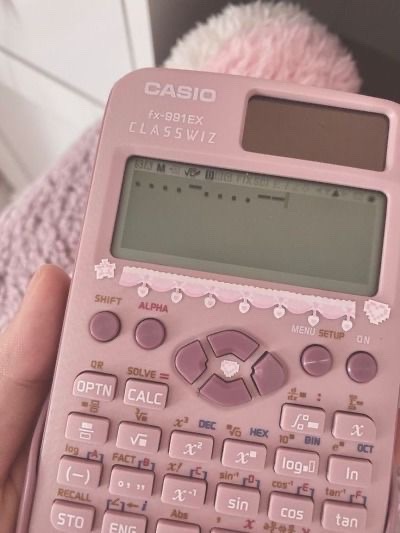

the second brain method
this method focuses on organizing the information you learn to maximize effectiveness. a common way of doing this is through the CODE method:
capture - be quick and efficient in how you receive the information
organize - organize the information in a way that works for you
distill - break the information down to its key elements
express - apply the information you’ve learned
* there is a ton of information out there about this method. if you struggle with burnout and knowing where to start, i recommend researching this method further to figure out what works for you.
the pomodoro method
the pomodoro method is a time management method. the most common expression of this method is to pick a task, work for 25 minutes on that task, then take a break for 5 minutes. then, repeat. if you’re planning to work all day, you may up the time spent studying. for example, after a while of this, you may work for 30 minutes at a time, then 40, then 45, and so forth. this method is particularly good for when you’re feeling unmotivated or having a hard time focusing. if you’re still not feeling it after a while, you may start to take longer breaks. for example, you may study for 30 minutes, break for 15, and keep going like that.
the 5 minute rule method
this method is good for when you have to do a shorter task, but you’re procrastinating doing it. this method requires you to dedicate only 5 minutes to do your task. after that, you may stop, but chances are, once you’ve started, finishing won’t be as difficult.
the blurting method
this method is particularly good for revision. the blurting method requires you to read over the content you are learning, then put it away and write down everything you know or can remember. then, check the content and revise everything you didn’t write down.
spaced repetition
spaced repetition requires you to spread out your study reviews over the period of a few days. this has been shown to improve memory. rather than studying one thing at a time, then studying something else the next day and so on, review the information right after you’ve learned it, then recall it after a few hours, then a few days, then a few weeks, and so on. if you’re studying something you will need to remember for an extended period of time, this method would be perfect for you!
active recall
this is my absolute favorite method! it’s been shown to improve your studying immensely and so many people have benefited from practicing active recall. active recall involves retrieving information from your brain, usually done through questions. a good way to do this is to explain the concept to yourself, to someone else, or act like you’re doing a presentation on the subject. after you’ve recalled all of the information you know about the subject, go over your material again and be sure you covered everything and explained everything the best way you could. if you didn’t, review everything you did not remember or got wrong, and go again. do this until you get everything. doing this can also be referred to as the feynman technique.
the SQ3r method
survey - skim your text and identify bolded text, headers, images, etc.
question - generate questions about the text based on what you surveyed. what are the key concepts in this text? what is each paragraph about? what information do i need to take away from this text?
read - read through the entire text and answer the questions you created
recite - summarize what you learned in your own words
review - recall the key concepts and answers to your questions
Random Study Tips

Don't study for too long if you are not enjoying it.
Take short breaks after 20-30 minutes.
Don't study in the living room, bedroom, etc.
Study in a separate place dedicated to studying.
Don't try to memorize without understanding. Try to understand the concept first.
Don't always study alone. Studying in groups helps a lot.
Don't highlight text blindly. Highlighting doesn't help that much. It only indicates Recognization not Recollection of the topic.
Always take notes. Reviewing the notes after a short time helps a lot.
Always try to teach others what you have learned.
Teaching is the best way of learning. Teach your parents, siblings, friends or even a rubber duck (programmers will know the rubber duck method).
Sleep is so much important for pushing something into your long-term memory. Get at least 7-8 hours of sound sleep.
Try to use the SQ3R (survey, question, recite, read, review) method while studying.
Use Mnemonics. It's the best way to memorize facts.

becoming a better student ₊˚⊹♡


Prepare for your classes ˚୨୧⋆。˚ ⋆
Wake up on time. We don't want to be stressed first thing in the morning, right?
Eat breakfast. So you will be able to better focus in class.
Assigned reading and homework. Make sure you are prepared for your classes!! :)
Review your notes. Going through some of your flashcards before class is really helpful.
Check your bag and charge your devices. Ensure you have everything you need: Books, homework, chargers, pens, water...


In Class ˚୨୧⋆。˚ ⋆
Listen and pay attention. You can save yourself a lot of trouble by simply paying attention, trust me.
Take notes. My favourite note-taking method is the Cornell method; I can make a separate post on that!! <3
"Quick notes." If you struggle with note-taking, try taking quick and messy notes. You can clean them up once you get home!!
Engage. If you have any questions or don't understand something, make sure to ask!! Most teachers really appreciate students who speak up. :)
No distractions. Turn off your phone, no chatting, you'll be glad...


After class ˚୨୧⋆。˚ ⋆
Finish your assignments as soon as you can. Go home, put on a cosy outfit, have a snack, and get working!! <3
Prepare flash cards. A great way of reviewing your notes, too... :)
Update your Study schedule. Write down any assignment and due dates, reading you must do, upcoming tests, etc...
Clean up your notes. Review them, highlight the important parts, and maybe even make them look cute!! :)
Don't avoid topics/Subjects you dislike. I know it is tempting, but you can't avoid them forever, so you might as well get them done


Structure and routine ˚୨୧⋆。˚ ⋆
Goals and Priorities. Keep them realistic and manageable.
Time management. Having a set schedule makes studying less overwhelming; it takes some discipline but is so worth it!! <3
Develop a routine. Figure out what works best for you; I prefer studying in the morning or at night.
No "zero days". Even if you can only do a bit, do it!! NO. ZERO. DAYS.
Remember your goals. Dreams will keep you motivated; remind yourself of what you're working for!! <3


Self-care and balance ˚୨୧⋆。˚ ⋆
Don't forget about your hobbies. You need to do things that make you happy, so make time for those things!!
Maintain a balanced diet. I know chocolates and junk are tempting, especially when you are busy studying all day, but you're not doing yourself any favours.
Sleep. Sleep. Sleep. 8 Hours. Non-negotiable.
Exercise regularly. Even if it's just a walk, put on some headphones, listen to music, and give yourself a break. <3
Care for your social life. Reach out to your friends, make plans, and keep in touch; a good work-life balance is critical!!


Romanticising ˚୨୧⋆。˚ ⋆
Study dates. Meet up with your friends at a cosy cafe, discuss your work, and have some fun!! Studying doesn't have to be all serious all the time ;)
Silly Pinterest boards. Visualising your goals will help you find motivation!!
Music to set the mood. I have a bunch of playlists on my Spotify that might help!! <3
Cosy sweater and candles. The cosy Rory Gilmore vibes haha...
Getting a coffee before class. A little treat before things get serious... Simple pleasures, you know? :)
Babes, The hiatus is OVER, and I'm finally back!! I got a lot of asks on studying, burnout, and school in general, so I thought, why not start off with a little student guide?? I Hope October has been kind to you, and school hasn't been too overwhelming (though I know it, unfortunately, has been for many of you), and I'm glad to finally be back!! <33
As always, Please feel free to add your own suggestions and tips in the comments!!
✩‧₊*:・love ya ・:*₊‧✩
ੈ✩‧₊˚The Perfect Mindmap; GRINDE
by Justin Sung


I personally don't have the patience to read through pages of notes that I have scribbled ferociously in the past few uni weeks, so I present the best tool for efficient active recall; mindmaps!
ੈ✩‧₊˚ The 6 step checklist:
✩Grouped - Organising concepts and ideas into groups that allow a more categorical setup which is the same method your brain uses to store information.
✩Reflective - It should reflect how your mind processed the information, how you see and recognise the data and what you understand from it.
✩Interconnected - Categorising and creating more connections within the groups, linking ideas together to retain a greater understanding and remember more concepts :)
✩Non-verbal - More doodling and symbols, less words, make it more personal for your own understanding and information retention.
✩Directional - You can see the Cause & Effect or the levels of priority. It should flow and relationships between ideas should be easily identifiable.
✩Emphasize - emphasizing the main concepts, and grasping the main ideas and their relevance for each group


good luck with your studies !!!
~winter
ଘ(੭ˊᵕˋ)੭* ੈ✩‧₊˚
ੈ✩ Habits for your academic life


Below are some habits and rules to keep in mind throughout your studies and some tips that will elevate your learning experiences.
☆ Setting boundaries and learning to say no
It is always easy to say yes and join every social event that one is invited to, however its crucial to consider your own personal life and the consequences of your decisions. Hanging out with friends is a needed event as a social creature, however it's better to exercise caution and know when to say "no" to focus on your own goals and dreams. Don't get pulled into the pace of others and focus on finding a routine and schedule that works for your own benefit.
☆ Being comfortable with your own company
You will find in uni that there are lots of times that you will spend alone, and maybe feel a little anxious that you're the only person who isn't constantly in the company of someone everyday like you maybe were in high school. However, realise that even the time to yourself is a time of value, and treasure those moments to focus and work on your own goals. It is easier to get lost and lose sight of your ambitions when with others who don't have the same aspirations as yourself. Use your own time to sit down and work out what you want to achieve and quietly put in the effort to win.
☆ Never being scared to ask questions
It can be quite daunting to ask questions in lectures, so I prefer to ask my questions during times that aren't forced into a short time interval, such as tutorials, office hours, and other forms of learning support that your university/college provides. This way there is no rush to answer my questions and take my time in working through concepts and ideas. Ask questions based on your own conclusions, questions that challenge current rules and perspectives. Think deeper into your lessons and seek to make use of every bit of information.


☆ Being curious
This is very much related to the point above, that being that personal interest really aids with the brains memory retention. The more things you approach with an enthusiastic attitude, the easier it is for your brain to remember and categorise. Having curiosity, even if it is forced, gives a great advantage where you seek to interconnect the information you learn with other data, and grow more networks of neurons that allows your brain to stay healthy and active.
☆ Initiating contact
Struggling with a theory or assignment? Great, it shows that you are actively trying to understand a concept and working your brain muscles. Now the best way to comprehend or complete what you are struggling with is to access support materials. Still difficult? Reach out. Your teachers, professors, tutors are all there for your benefit. Use them intelligently and squeeze every drop of assistance and support from them while they are still available to you.
☆Watching educational content to aid your studies
You can never lose from learning a bit more every day. However make sure to fact check and find your information from trusted and quality sources. In general, it's always a win to be educated in various topics from health, sciences, arts, humanities and more to gain a better understanding of ourselves, our world, and humanity.
For example, I watched a ted talk today, and here is my conclusions from my notes:
ੈ✩TedX: Why Reading Matters by Rita Carter
Summary:
☆Your brain needs a workout as much as your body. And reading fiction seems to be one of the best workouts you can get. (I recommend quality fiction, with that being classic literature because it genuinely exercises your mind with its intricate language techniques and diverse vocabulary)
☆Not only is it good for you, but it's also good for society as a whole because the brain is like a muscle: the more you force yourself through books to take other people's perspectives, to sympathise, to empathise with other people, the more empathetic a society we will have.


ੈ✩‧₊˚
good luck lovelies
~winter
ଘ(੭ˊᵕˋ)੭* ੈ✩‧₊˚









